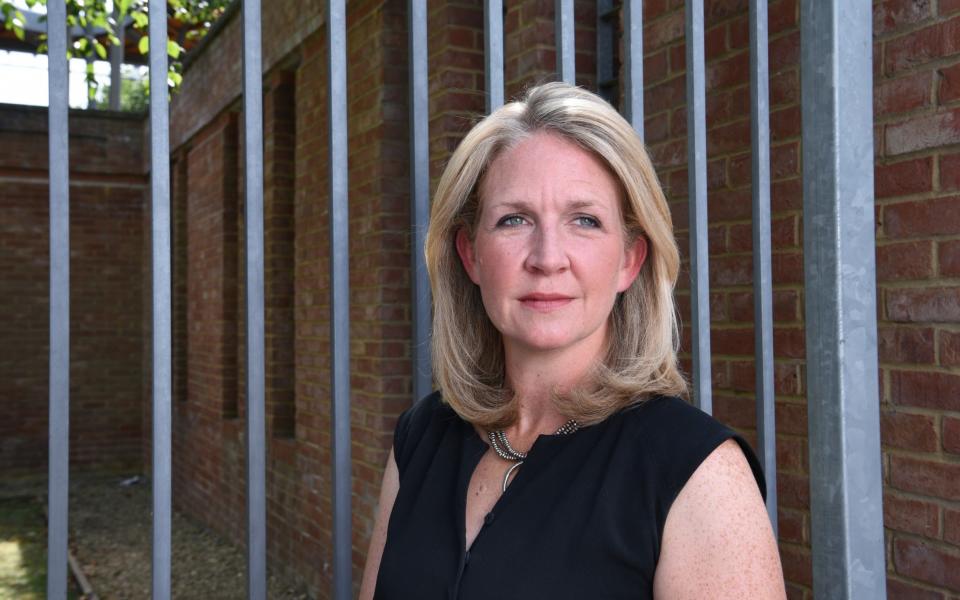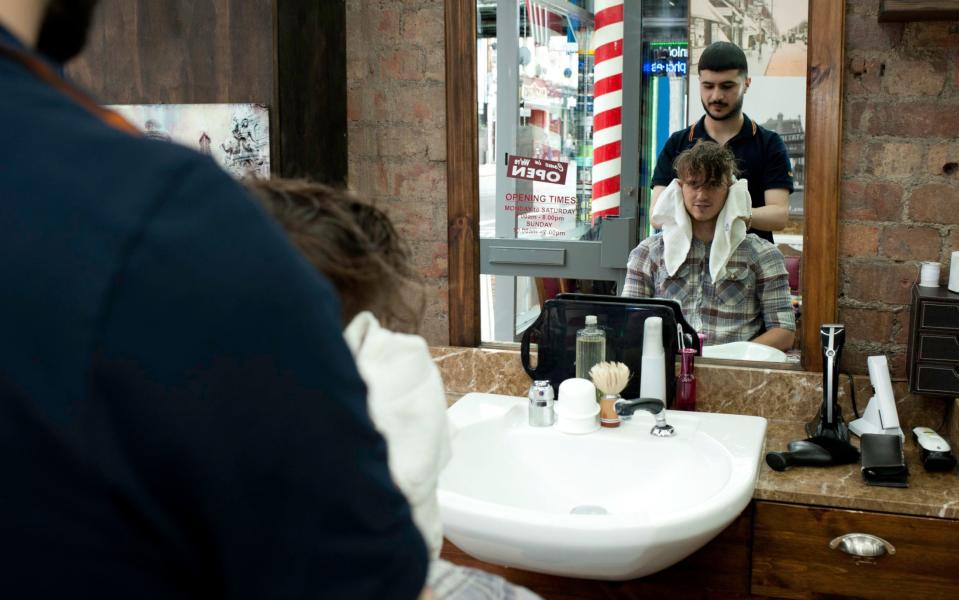The barbershop’s red and white striped pole, which promises everything from a quick haircut to a beard sculpture and a scalp massage, is a staple of the British high street.
And now that male grooming has gone mainstream, the number of barbershops has exploded.
There are now 17,702 branches nationwide, a 50% increase since 2018, with 918 new branches opening in the past year alone, according to the National Hair and Beauty Federation (NHBF).
However, experts warn that behind their modest exteriors, many barbershops are involved in human trafficking, forced labor, drug trafficking and money laundering.
Buying a cheap haircut risks lining the pockets of criminal gangs who exploit workers for profit, says Chief Inspector Charlotte Tucker of Wiltshire Police, the officer behind the prosecution of Britain’s first modern slavery case.


“If something is really cheap, like a £10 haircut in London, that can be a red flag that workers may be underpaid, or paid nothing at all.”
According to consumer data platform Statista, the average price for a haircut and beard trim is €19.
But this number hides major regional differences, with some haircuts in the North East costing as little as £5, while in the trendy areas of West London you can pay £100-plus.
“Everyone loves a bargain,” adds DS Tucker. “But if something feels too good to be true, it probably is.”
‘Cycle of misery’
According to official estimates, there are at least 100,000 victims of modern slavery and human trafficking in Britain.
Traffickers exert emotional or economic control over workers – who are often poorly educated and do not speak English – and pay below the legal minimum to increase profits.
If the criminal gang or individual has paid for the worker to come to Britain, they will exploit this “debt bond” to get the worker to do whatever they want. “It perpetuates a cycle of misery,” says DS Tucker.
Nail salons, beauty salons and car washes have traditionally been hubs of human trafficking.
DS Tucker’s two-year investigation into the forced labor of Vietnamese teenagers in nail salons in Bath and Burton-on-Trent resulted in three convictions.
The young salon workers had been trafficked to Britain and forced to work 60 hours a week for little or no pay.
But while barbershops have received less attention, the lack of supervision and cash nature of the trade makes it just as ripe for illegal employment, according to Justine Currell, director of modern slavery charity Unseen.
“We have had a number of cases of exploitation in barbershops. This concerns, for example, the possibility of renting chairs and the transience of the work. You can let employees come and go.
“It’s a quick cash transaction. Even if it is not just about cash, we still see people being exploited, working long hours and not receiving the wages they would expect.”
Unseen identified 30 cases of labor abuse and modern slavery involving barbershops and hairdressers between 2016 and 2023, including five cases last year.
‘Drug activities, money laundering and wider corruption’
Ms Currell suggests that the recent increase in the number of barbershops reflects a shift in the way criminal gangs operate.
“Most of the media attention was on nail bars and car washes,” she says.
“But it’s like Whack-a-Mole. You start putting pressure in one area and the criminal gangs will show up somewhere else, and you realize you haven’t stopped it, you just moved it.
“And [the criminals] think ‘Okay, you’ve got your eye on the ball in this area, so we’ll go somewhere else. That is what we see happening.”
She adds that modern slavery in barbershops can go hand in hand with other forms of crime.
“Drug activity, money laundering, broader corruption – it happens behind what is seen as a legitimate high street on your doorstep, obscuring a lot of criminal activity, including the exploitation of workers.”
While most barbershops are legitimate, law-abiding businesses, some have been linked to criminal gangs that make money by smuggling migrants into Britain.
A 2022 National Crime Agency (NCA) investigation found that an Afghan hairdresser used his barbershop in Cricklewood, North West London, as a front for people smuggling.
Gul Wali Jabarkhel had offered truck drivers thousands of pounds to take people illegally from France and Belgium to Britain. He and three associates were sentenced to ten years in prison.
George Voloshin, an anti-money laundering expert at the Association of Certified Anti-Money Laundering Specialists, says the barbershops that operate illegally are “very often” run by ethnic minority organized crime groups.
He adds: “Barbershops are mostly owned by Middle Eastern individuals, including Kurds, as well as Turks and North Africans.”
The recent rise in the number of barbershops has made it more likely that some of these operations are a front for people smuggling, including in small boats across the Channel, DS Tucker said.
“It makes sense that there is a connection between the two,” she says.
What to pay attention to
If you get your hair cut at the barber, DS Tucker says there are several things to look out for that could indicate your money is benefiting criminal gangs.
“If there seems to be a cascade of different employees working and they look tired, sloppy and miserable, this could be a sign of exploitation.
“If you don’t pay your staff well, you can undermine competition. It fuels a cycle of organized criminals who make money by not following the rules.”
If the company insists on only accepting cash payments, this could also be a cause for concern.
The National Crime Agency’s anti-modern slavery operation – “Operation Aident” – investigates properties suspected of housing exploited workers.
But police can only reach so much, says DS Tucker.
“We really rely on the public to whistleblow. It’s about customers crying out.
‘This is not a problem that you can solve with the police. It is not that there is no will to eradicate crime, but it is very difficult to detect.
She adds that anyone suspected of illegal behavior can call Crimestoppers or 101, or submit community information on the local police website.
“[The customer] I can say they went into a barber shop and it only cost £10 and there were other signs that the workers were not being treated well.”
Prospect
Although there is no evidence that more than a minority of barbershops operate illegally, they can be a tempting option for criminals looking to launder the proceeds of crime.
Money laundering involves passing ill-gotten gains through a company’s books and paying taxes on them, making it appear as legitimate income.
Mr Voloshin says barbershops are a “classic example” of a front company for money laundering.
“They can be barbershops, small shops, laundromats, souvenir shops – in short, cash-intensive businesses. These are often used to launder dirty money.
“It could be related to gambling, drug trafficking, human trafficking, prostitution, extortion – anything of this nature,” he adds.
“Cash is difficult to trace and criminals collect a lot of cash in small quantities. These establishments are legitimate in the sense that they have real customers, but when calculating profits they usually inject some dirty money into the clean money.”


According to Ms Currell, a common trick is for “cunning businessmen” to repeatedly open one business after another.
“Their board positions are all over the place if you look at Companies House,” she says.
“You have a model where one or two people try to make as much money as possible, then close the company and start another company under a different name. We have seen that very regularly. They are gaming the system.”
This makes perfect sense, says Mr. Voloshin.
“From a bank’s perspective, they will see customers depositing cash on a daily or weekly basis. If the bank observes a large spike in cash injections, this can be classified as suspicious.
“So for a criminal who runs a barbershop and wants to launder drug money, it would be much wiser to open a barbershop nearby instead of pouring more money into the previous business. So there is no alarm signal on the bank’s radar. .”
An HMRC spokesperson said: “We routinely work with partners to address a variety of compliance risks across business sectors.
“While we cannot discuss identifiable companies, we take all reports of misconduct very seriously and take strong action to ensure everyone pays the tax they owe.”
Caroline Larissey, CEO of the NHBF, said: “While the NHBF is aware that a small number of hairdressers may be involved in illegal practices, the sector is the most robust on the high street.”
An NCA spokesperson said: “While most large companies will be completely legitimate, organized crime groups may attempt to use companies to conceal their activities or launder the proceeds of crime.
“Companies that often deal in cash are among those that could be exploited in this way.”
Recommended
How much your coffee habit is really costing you
read more